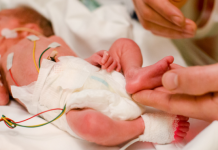 “High-risk pregnancy” is a phrase no mom wants to hear, but it doesn’t have to be scary. The experts at UnityPoint Health – Des Moines Perinatal Center are here to calm your fears and help you have a safe and healthy pregnancy.
“High-risk pregnancy” is a phrase no mom wants to hear, but it doesn’t have to be scary. The experts at UnityPoint Health – Des Moines Perinatal Center are here to calm your fears and help you have a safe and healthy pregnancy.
Many maternal health conditions fall under the “high-risk pregnancy” umbrella, including advanced maternal age (a pregnant woman over the age of 35), diabetes, high blood pressure, thyroid disorders, and clotting disorders. Also included are fetal conditions such as anatomic or chromosomal anomalies, twins, and higher-order pregnancies. Patients can also be seen at the Perinatal Center for preconception counseling for moms that have had a prior complicated pregnancy, or that have a medical or surgical condition that may affect a future pregnancy.
Oscar Viteri, MD, is a perinatal physician who is passionate about caring for high-risk pregnant moms. “Perinatology is the only subspecialty of medicine that allows physicians to provide comprehensive care to two lives at the same time,” said Dr. Viteri. “These lives are interconnected and rely so much on each other, providing me with a unique opportunity to improve their health.”
Recovery Tips
Although an uncomplicated vaginal delivery is often preferred, it’s good for expectant moms in the high-risk category to be prepared for a possible c-section:
- Accept help from others. Although c-sections are quite common (roughly 32% of all U.S. births), remember that this procedure is major abdominal surgery. You will be very sore and restricted in what activities you can do and how much weight you can lift. Let your mom, partner, or friend do the chores and help with the baby while you rest.
- Be good to your body. Drink lots of water to stay hydrated and prevent constipation, take your pain medications regularly, even at night, and be sure to get up to take short walks frequently to increase blood flow and reduce your risk of a blood clot.
- Grab a pillow. The pain from your procedure’s incision will last for some time, so the extra support provided by a firm but the soft pillow will be helpful. Hold it over your belly when you laugh, cough, sneeze, or stand up or sit down.
- Give yourself patience and grace. It may take longer than you would like to fully heal, and you may experience things that you didn’t expect, like difficulty sitting up or turning over in bed, numbness in your abdomen, and swelling around the incision. Be sure to call your perinatal provider if you have any questions about your recovery experience.
 Support for a High-Risk Pregnancy
Support for a High-Risk Pregnancy
If you fall into that “high-risk pregnancy” category, remember that it’s probably not as scary as you think. Schedule an appointment with your experienced perinatal providers who provide excellent care in a comfortable environment. From the front desk staff checking you in, to the sonographer performing the ultrasound to the provider answering all your questions, the Perinatal Center staff will put your mind at ease as you work together to develop a plan of care, keeping you safe and informed for the duration of your pregnancy. Contact the UnityPoint Health – Des Moines Perinatal Center at 515-241-8383 or visit them on the web.
Connect with UnityPoint Health Des Moines
Website
Facebook
Twitter
YouTube
Instagram
Pinterest
This post is part of a series of sponsored posts by UnityPoint Health Des Moines.
Summer Safety Tips from Blank Children’s Hospital
Fun Indoor Activities for Winter
Perinatal Mood and Anxiety Disorders
A Mother’s Personal Story of Loss and Window Safety

















